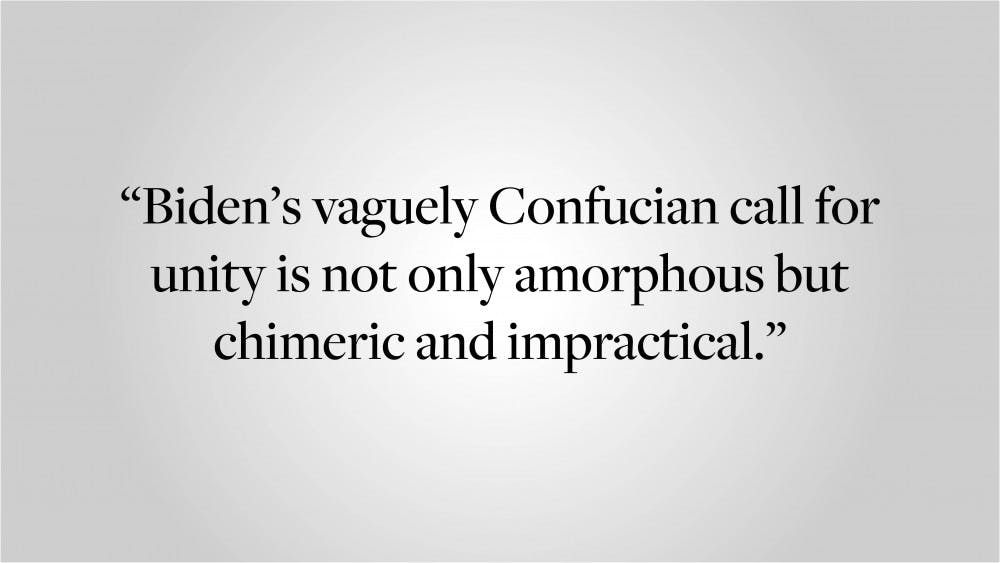As the contentious “battle for the soul of our nation” drew to a close, President Biden took the stage last Wednesday after being sworn in as the 46th president of America. Throughout the inaugural proceedings, the new administration’s front of political cohesion and concord was emphatic, from Amanda Gorman’s poetry reading—which featured hopes for harmony amidst the turn of the new administration—to Vice President Harris’s prominent purple coat—an intentional melding of red and blue.
These events culminated in President Biden’s inaugural address: replete with messages of the country’s shared experiences over the tumultuous past year, it spoke of moving beyond the hurdles posed by the riots and contention of recent weeks and months. His speech was a call for civility, a call to simmer down and a call to find common ground. It was also perhaps the most hackneyed political rhetoric that our president could have offered in today’s climate.
In the aftermath of a controversial election, a quarter of the nation remains doubtful of the legitimacy of Biden’s appointment, and over half the country believes that the greatest threats to America are “other Americans.” On an extreme level, a non-negligible percentage of Trump supporters ascribe to “Q-Anon” conspiracy theories, which in part allege that the Democratic Party is dominated by pedophiles. This theory has been repeatedly and thoroughly disproven, but it calls into question what Biden can possibly do to garner the reconciliation of these groups. Ultimately, they are Americans too.
An idealistic cry for cohesion cannot and will not bridge the gaps that have ravaged the essence of this polarized country. From the politicization of healthcare — made abundantly more salient by the COVID-19 pandemic — to the radically different approaches adopted by the right and left on taxation plans and investments in green energy, America remains divided on most planes.
To a great extent, these divisions are to be expected. We have entered an era of “alternative facts” and simultaneous realities. Individuals have grown increasingly likely to choose to identify with evidence and social groups that affirm their beliefs while dismissing sources of opposition. Any semblance of collective unity would require an admission of defeat from the extremists on both sides of the political spectrum and that vast quantities of ideological grievances be swept under the rug — actions that neither side seem willing to consider.
It is imperative to note, however, that the nation’s ever-increasing polarity is merely a symptom of the underlying pendulum that swings in favour of the constituents whose party is currently in power. For example, Trump’s presence was largely a result of the latent struggles that predated his administration. His platform earned support from right-wing populists who have been historically hindered from breaking through the “cash ceiling” to gain political representation. His stances and rhetoric on immigration angered progressives but garnered support from frustrated white working-class Americans who expressed concern over prospects of cultural and economic displacement within the United States. Likewise, Biden’s subsequent rebuttal and undoing of Trump’s immigration policies will undoubtedly garner the admiration of progressivist crusaders but can be expected to alienate him from blue-collar Americans. The changing of the guard will always be met with national divisions on the basis of personal values and priorities.
Biden’s vaguely Confucian call for unity is not only amorphous but chimeric and impractical. The soul of America is strengthened by our collective moral and ideological diversity as it is expressed and transcends across political platforms. Even our elections, legislation and news outlets are hallmarks of our ability and responsibility to freely disagree and advocate for the convictions we hold. After all, the ideas and causes that we stand for are hardly trivial but encompass matters of our livelihoods, of civil rights, of the future of our planet and of the sanctity of human life. Ideological heterogeneity signals a healthy and active democratic process. It is needed to facilitate open-minded inquiry and exploration of the needs of different subsects of the American population.
As we move forward, we must not conflate our optimism with blind faith that a new administration will redress the fallacies of the last and bridge the widening chasm between the right and left. The presence of a new, slightly more moderate administration in the White House is no catalyst for reconciliation. There will be no panacea that will suddenly allow our nation to appease its long-standing and deeply entrenched differences. What we can do, however, is embrace opportunities to learn and engage on an individual level with those who hold values and ideologies that are systematically “other” than our own. We can commit to disentangle ourselves from the snares of tribalistic groupthink and argue based on the merits of our ideals. It is possible to recognize our shared humanity while also engaging in impassioned counterarguments and debate. And when we engage, it should not be in hopes of unity or socio-political cohesion, but rather to undertake an exercise in tolerance and better balance our convictions and needs with empathy and compromise.
The road ahead of President Biden and our new administration is much steeper and challenging than his speech implied. Let’s hope that he is aware of that, and that his track record of reaching across the aisle prepares him well for the momentous years ahead.
Nidhi Bhaskar ’21 can be reached at nidhi_bhaskar@brown.edu. Please send responses to this opinion to letters@browndailyherald.com and op-eds to opinions@browndailyherald.com.





